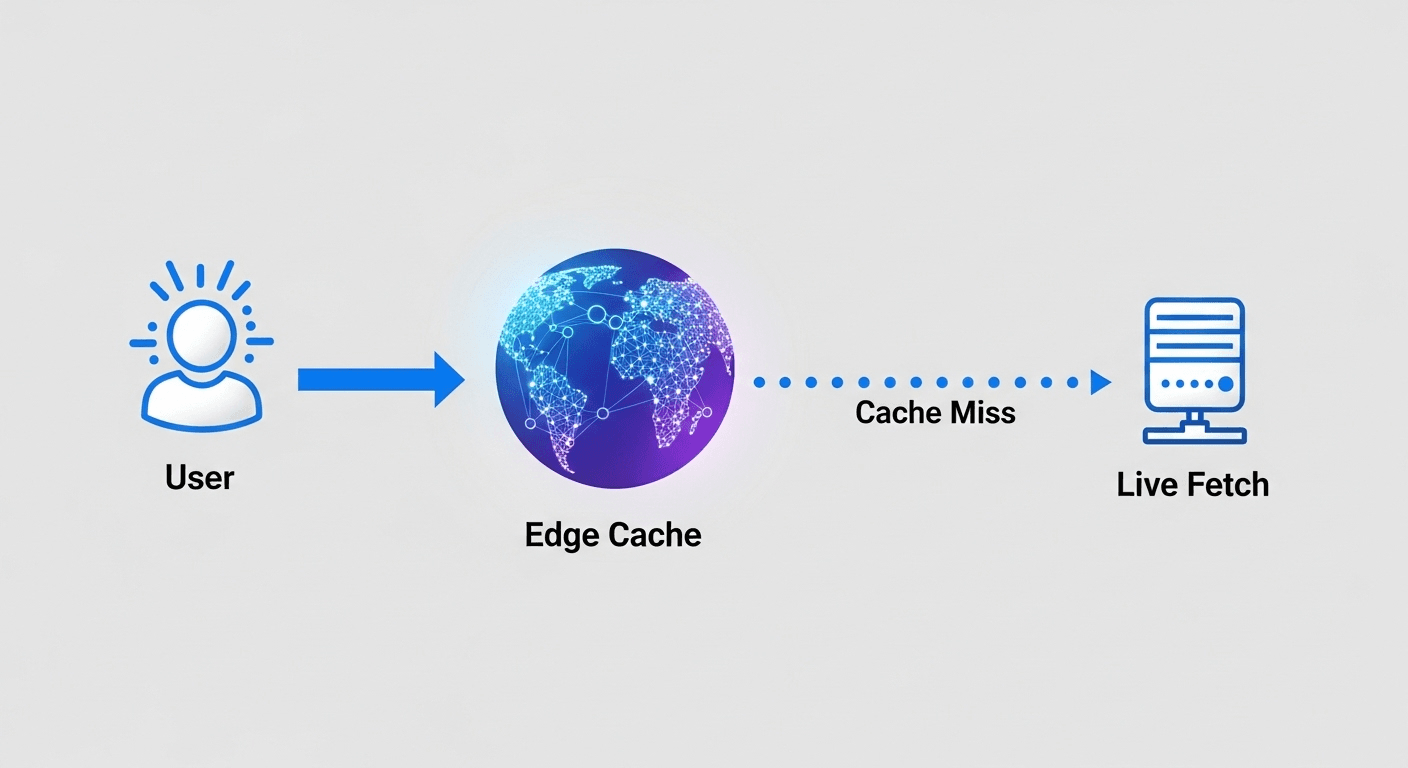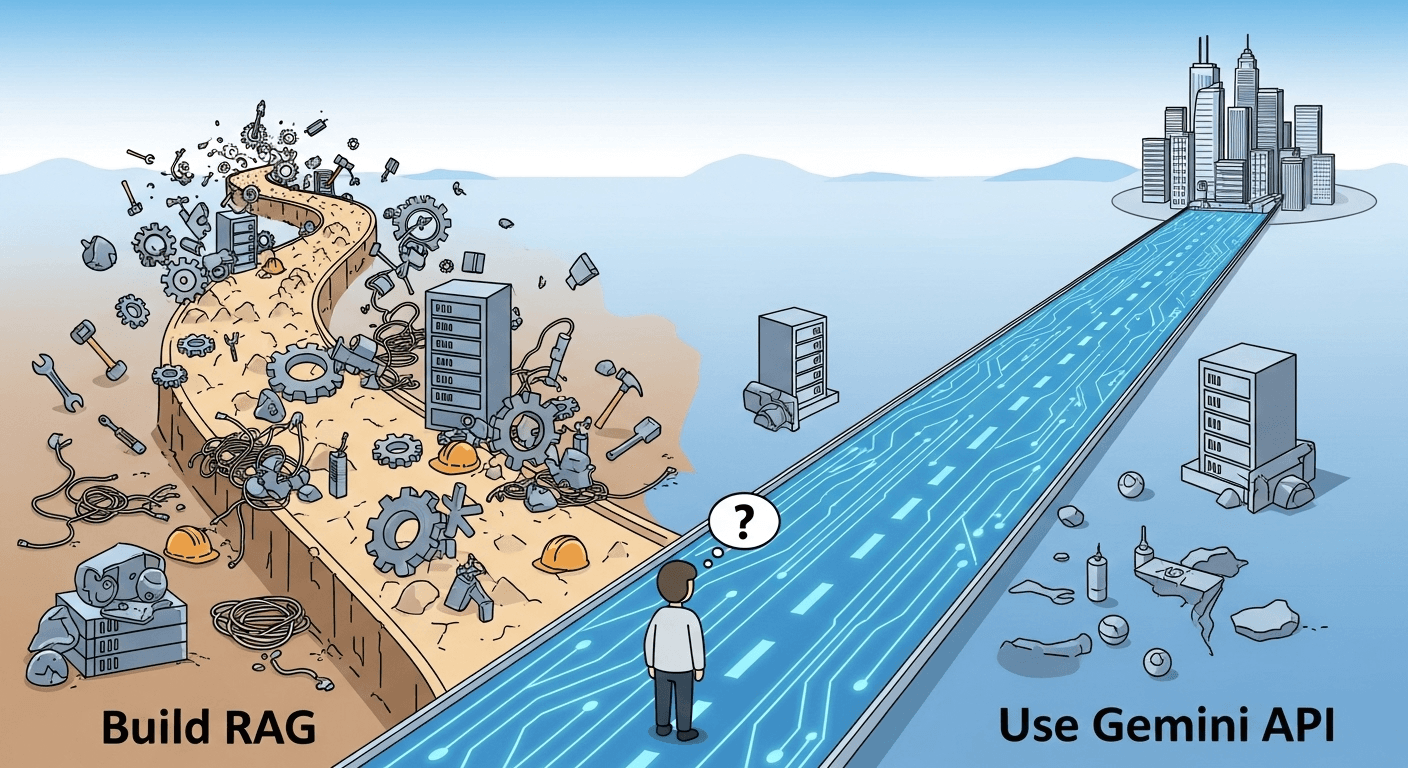- Published on
Stop Building RAG Pipelines: A Developer's Deep Dive into Gemini's URL Context Tool
- Authors

- Name
- Mark Beacom
- @mbeacom
Stop Building RAG Pipelines: A Developer's Deep Dive into Gemini's URL Context Tool
As technology leaders and developers, our mandate is to deploy engineering resources on initiatives that create a competitive advantage, not on undifferentiated heavy lifting. Yet, many teams are consumed by building and maintaining custom Retrieval-Augmented Generation (RAG) pipelines—a complex and expensive distraction from their core mission.
What if you could replace that entire distributed system of ingestion, chunking, and vector management with a single, managed API call?
This is the promise of Gemini’s URL context tool, an architectural paradigm shift that transforms the entire RAG workflow for public web content into a serverless utility. It allows you to build more intelligent products faster and with a fundamentally lower Total Cost of Ownership (TCO).
The Architecture of Value: How It Works
The tool’s design delivers the optimal balance of performance and data freshness with zero operational burden.

- Global Edge Caching for Low Latency: It first checks a globally distributed edge cache for the URL's content.
- Business Impact: This ensures a consistently fast, low-latency experience for your users, which directly improves satisfaction and retention.
- On-Demand Fetching for Real-Time Data: If the content is stale or not cached, the service performs a live fetch to retrieve the latest version.
- Business Impact: This enables systems that operate on up-to-the-minute information—from financial reports to competitor press releases—without the cost of maintaining a fleet of web scrapers.
Combine Discovery and Analysis for Strategic AI
Effective AI solutions require both broad discovery and deep analysis. The Gemini API provides complementary tools for each.
- URL Context Tool (For Depth): When you have an authoritative source, this tool provides a deep, comprehensive analysis of its entire content. It's like giving an expert a specific document to synthesize.
- Google Search Tool (For Breadth): When your objective is discovery, this tool scours the public web to identify the most relevant sources. It’s like tasking a research team to find the best documents on a topic.
The most sophisticated AI architectures chain these services. An AI agent can first leverage Google Search to identify critical URLs and then pass them to the URL context tool for a conclusive, evidence-based analysis, elevating your solution from a simple Q&A bot to an automated expert analysis system.
# Example of combining Google Search and URL Context for expert analysis
from google import genai
from google.genai.types import Tool, GenerateContentConfig
client = genai.Client()
model_id = "gemini-2.5-flash"
# Enable both tools in the request
tools = [
{"url_context": {}},
{"google_search": {}}
]
response = client.models.generate_content(
model=model_id,
contents="Find the top 3 recent announcements from the Gemini API changelog and summarize the key developer impacts.",
config=GenerateContentConfig(
tools=tools,
))
print(response.text)
The Build vs. Buy Equation for Data Retrieval
For the vast majority of use cases involving public web data, a self-hosted RAG retrieval pipeline has become an architectural anti-pattern—an unnecessary liability that diverts resources from value creation.

- Buy: The Strategic Choice for Velocity and Focus: Opting for Gemini's managed service frees capital—both financial and human—from non-differentiating tasks. This is the superior choice for public web content, allowing you to focus 100% on the application logic that serves your customer.
- Build: A Tactical Necessity for Niche Control: Self-hosting is only necessary for use cases requiring absolute control, such as accessing resources in a private VPC or navigating stateful, authenticated sessions. This path carries the full burden of security, maintenance, and operational costs.
Activate High-Value Enterprise Use Cases
Integrating this managed service is a catalyst for high-impact business automation.
- Transform Customer Support: Slash resolution times by empowering agents (human or AI) with instant, accurate answers grounded in your public technical documentation.
- Automate Competitive Intelligence: Deploy a serverless function to analyze competitor announcements the moment they are published, delivering automated intelligence briefings.
- De-Risk Your SDLC: Integrate an AI agent into your CI/CD pipeline to validate public-facing changes, comparing staging and production URLs to automatically generate a "summary of changes" for release notes.
- Accelerate Engineer Onboarding: Reduce new-hire ramp-up time by directing the model to a GitHub repository to generate architectural summaries and setup instructions.
Getting Started: A Practical Example
Getting started is incredibly simple. Here's a quick demo of a script that compares two roast chicken recipes online, and even handles a bad URL gracefully (or you can check out this demo source here):

Now, let's look at the code that makes this happen:
"""Demonstrate the use of the URL context tool with Gemini model in Google GenAI."""
from google import genai
from google.genai.types import GenerateContentConfig
print("Demo: Using URL Context Tool with Gemini")
# Initialize the GenAI client
client = genai.Client()
# Define the model and tools
MODEL_ID = "gemini-2.5-flash"
TOOLS = [
{"url_context": {}},
]
# Define the URLs to be used as context
URL_1 = "https://www.foodnetwork.com/recipes/ina-garten/perfect-roast-chicken-recipe-1940592" # Correct URL
URL_2 = "https://www.allrecipes.com/recipe/21151/simple-whole-roast-chicken/" # Erroneous URL to test error handling
URL_3 = "https://www.allrecipes.com/recipe/70679/simple-whole-roasted-chicken/" # Correct URL
print(
"Generating content with URL context from multiple sources: "
f"\nSucceeds: \n- {URL_1}\n- {URL_3}\n\nFails: \n- {URL_2}\n"
)
response = client.models.generate_content(
model=MODEL_ID,
contents=f"Compare the ingredients and cooking times from the recipes at {URL_1}, {URL_2}, and {URL_3}, "
"tell me if a recipe fails to load / be incorporated, but continue.",
config=GenerateContentConfig(
tools=TOOLS,
))
print("Response Text:\n\n", response.text)
# You can also inspect the metadata to verify which URLs were used
print("\n\nURL Context Metadata:\n\n", response.candidates[0].url_context_metadata)
Governance by Design: De-Risking Enterprise AI
Enterprise AI cannot be a black box. The Gemini API provides governance as a native feature. The url_context_metadata returned with every response serves as an immutable audit trail, linking the model's output to the precise source URLs used in its generation. This isn't just a debugging tool; it's a core governance mechanism for building trustworthy and compliant AI systems.
Production Guardrails for Pragmatic Adoption
- Architectural Guardrails: Understand the service’s boundaries. It is designed for deep analysis of a specific list of URLs, not as a recursive web crawler. It operates on the public internet and cannot access authenticated sessions or private networks.
- FinOps and Cost Management: All retrieved content contributes to the model's input token count and is a primary cost driver. Architect for cost-efficiency with models like
gemini-2.5-flashand implement rigorous budget monitoring.
The Bigger Picture: Reallocate Your Capital from Infrastructure to Intelligence
The competitive landscape will be defined not by who builds the most elaborate infrastructure, but by who delivers intelligent applications to market the fastest.
By abstracting data retrieval into a scalable, on-demand API call, Gemini's URL context tool lets you shift your investment. Move your budget and engineering talent away from commodity RAG infrastructure and toward the high-value work that differentiates your business. The mandate is clear: stop managing the plumbing and start delivering intelligence.

